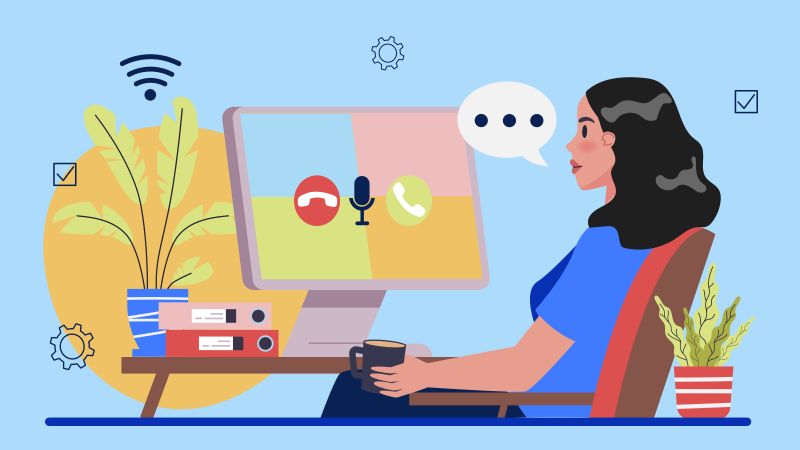The future isn’t coming — it’s already here. As of mid-2025, around 88% of companies worldwide are using AI in their hiring process. For them, it’s about efficiency, consistency, and better organization.
For candidates, though? It often feels the opposite.
When I spoke with four job seekers recently, three said they’d flat-out decline an AI interview.
Their reasoning: if a company won’t send a human to the first chat, what does that say about the job? Reddit threads echo the sentiment, calling AI interviews “awkward,” “cold,” and “like talking to a black box.”
But like it or not, AI interviews are here to stay — and skipping them means skipping your shot.
With the right prep, though, you can crack the system, reach a real person, and get the job you want.
In this article, you’ll learn:
- The differences between AI and human interviews, and what to focus on.
- Tips for preparing for an AI interview.
- How to structure your responses in an AI interview, how to come across as confident, and how to demonstrate your alignment with the role.

Don’t waste days compiling overused interview techniques. Get original answers to every single question you could expect.
AI Interviews vs. In-Person Interviews (and What That Means for Your Prep)
If you’ve already sat through an AI interview, you know it’s a slightly different vibe. If you haven’t, fret not — I’ll walk you through how it stacks up against a human interview and what that means for your prep.
Common interview questions remain the same
The questions in an AI interview won’t surprise you; they’ll sound a lot like what a human interviewer would ask. What you can expect:
- Static questions on a pre-recorded video.
These are the same for every candidate and include common questions like “What are your strengths and weaknesses” or “Why do you want to work here”.
💡Important thing to remember: because these are pre-recorded questions, they won’t focus on the context of your career (for example, the question will be “Why do you want to work here”, not “Your resume says you’ve been in an X industry for 10 years. Why do you want to switch to the Y industry, and why our company specifically?”).
For you, this means that you have to think about each question within the context of your career, anticipate what they might be interested in, and make sure you cover it in your answer. There won’t be a human interviewer to ask probing questions to get a better understanding of your skills and career, so you’ll have to make sure you provide all the necessary details on your own.
- Dynamic questions tailored to your resume and the job description.
In this case, the interview will very much resemble a real one — AI will ask personalized questions based on your career trajectory, and perhaps some probing questions to dig deeper.
You’ll still need to be careful to include all the relevant information and stay a step ahead.
How to prepare for interview questions
- Go through the job description and extract key tasks, responsibilities, and skills.
- Create a list of your accomplishments that demonstrate these skills and show you took on these responsibilities in the past successfully.
- Think about how to best structure the story around each skill/responsibility (keep reading to learn how).
- If you’re changing roles, industries, or switching to a leadership role, make sure you account for that too — state what drove you to make the change, how you can be successful in it, etc.
- Then practice telling these stories from different angles. For example, the same story about leading a project could be used to answer a leadership question, a conflict question, or a problem-solving question. Don’t script them word-for-word, but get comfortable flexing them to fit what’s asked.
There’s no room for small talk
With AI, there’s no chance to break the ice with a smile or a bit of chit-chat at the beginning of the interview. It won’t ask about the weather or the latest pop culture moment, so easing into the interview might be a bit more difficult, because you’ll jump straight into answering questions.
That makes your very first answer critical, since you won’t get the luxury of warming up — and you know first impressions matter, even with AI.
Luckily, there’s a 99% chance that the first question you’ll hear is some version of “Tell me about yourself”, so you can prep in advance and nail your answer. Here are more details on how to answer this question:
And don’t forget to prepare and practice your elevator pitch — you can weave the details into your answer.
AI needs clear signals
A human interviewer can pick up on nuance, read between the lines, and ask for clarification about your skills or experience. And in an unfortunate case of you going off on a tangent, they can gently nudge the convo back into the right direction.
An AI system? Not so much.
It’s looking for certain signals:
- Relevant keywords
- Clear answer structure
- Clear alignment with the role
- Confident tone without verbal filler or awkward silences
- Steady pacing
If you don’t hit those, it means that your answer is not strong. Even if you’re the perfect candidate with great experience, it won’t matter.
How to give AI the right signals
Lean on frameworks like STAR or PAR to give your answers structure, and always try to naturally use keywords from the job description. Practice your answers — it’ll help with confidence and steady pacing.
We’ll break down exactly how to do this in the next section.
Tips to Prepare for an AI Interview
Now that you know what AI is looking for, let’s talk about how to hit the right signals and move on to the human part of the process.
Answer questions clearly
As we said, AI tools aren’t great at reading between the lines. They need structure and are scanning for clear signals.
So — you need to structure your answers.
It means having sharp answers that are based on storytelling and have a clear intro, action, and outcome. There are a few ways to structure them to stay clear and avoid rambling.
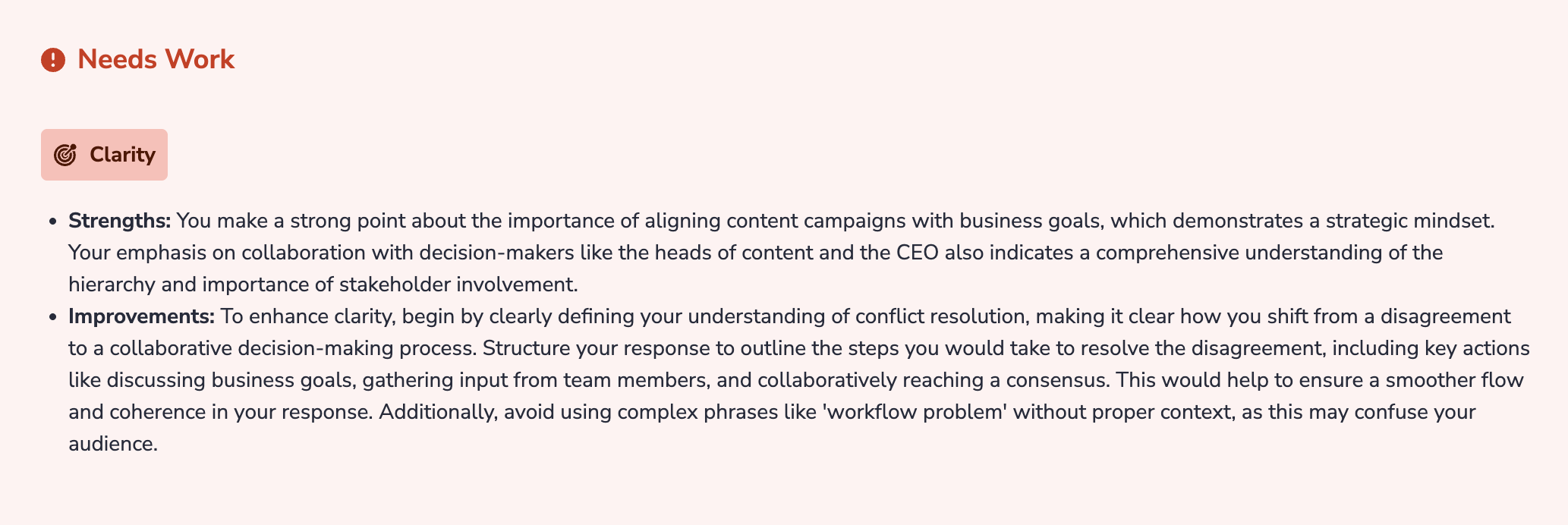
You can use two simple frameworks when coming up with answers:
STAR (Situation, Task, Action, Result)
- Situation: Describe the context and set the scene.
- Task: Your specific task or responsibility in that situation.
- Action: Describe specific steps you took to complete the task and resolve the situation. (This part needs to be the most detailed and the longest, because it shows AI and recruiters how you think and solve problems.)
- Result. Mention the results of your actions, ideally quantified.
For example:
Interview question:
“Your resume says you improved customer satisfaction scores by 15% at your last company. Can you describe how you did this?”
Answer:
Our team was struggling with low satisfaction ratings. Customers often felt their issues weren’t resolved on the first call, and that frustration showed up in the surveys. (Situation)
My goal was to figure out why customers weren’t getting what they needed and help improve our satisfaction scores. (Task)
I started tracking the most common complaints and realized that a lot of problems came from unclear product instructions. I worked with the product team to create a simple FAQ and quick reference guide for our reps. I also suggested a new call flow script that helped us gather the right information upfront, so we could solve issues faster. (Action)
Within three months, our first-call resolution rate went up by 20%, and customer satisfaction scores improved by 15%. Management rolled out the new process across the whole department after seeing those results. (Result)
PAR (Problem, Action, Result)
It’s almost the same as STAR, just a bit leaner — you set up the problem, explain the action you took, and share the result.
For example:
Interview question:
“Your resume says you reduced inventory errors by 30% in your last job. How did you manage that?”
Answer:
As a warehouse associate, I introduced a double-check system where one team member logged items while another verified counts. I also created a quick training guide for new hires on our scanning process. (Action)
Within two months, inventory errors dropped by 30%, and on-time shipments increased noticeably. The system became a standard practice for the whole team. (Result)
Demonstrate alignment with the role
One of the main things both interviewers and AI systems are looking for is fit. They want evidence that you understand what the role requires and that you have the skills to succeed in it.
How to find the keywords
To demonstrate that you’re a good fit for the role, the first step is research. Scan the job ad for repeated keywords and required skills, then dig deeper into what that role typically entails in the industry.
Take a look at this example:
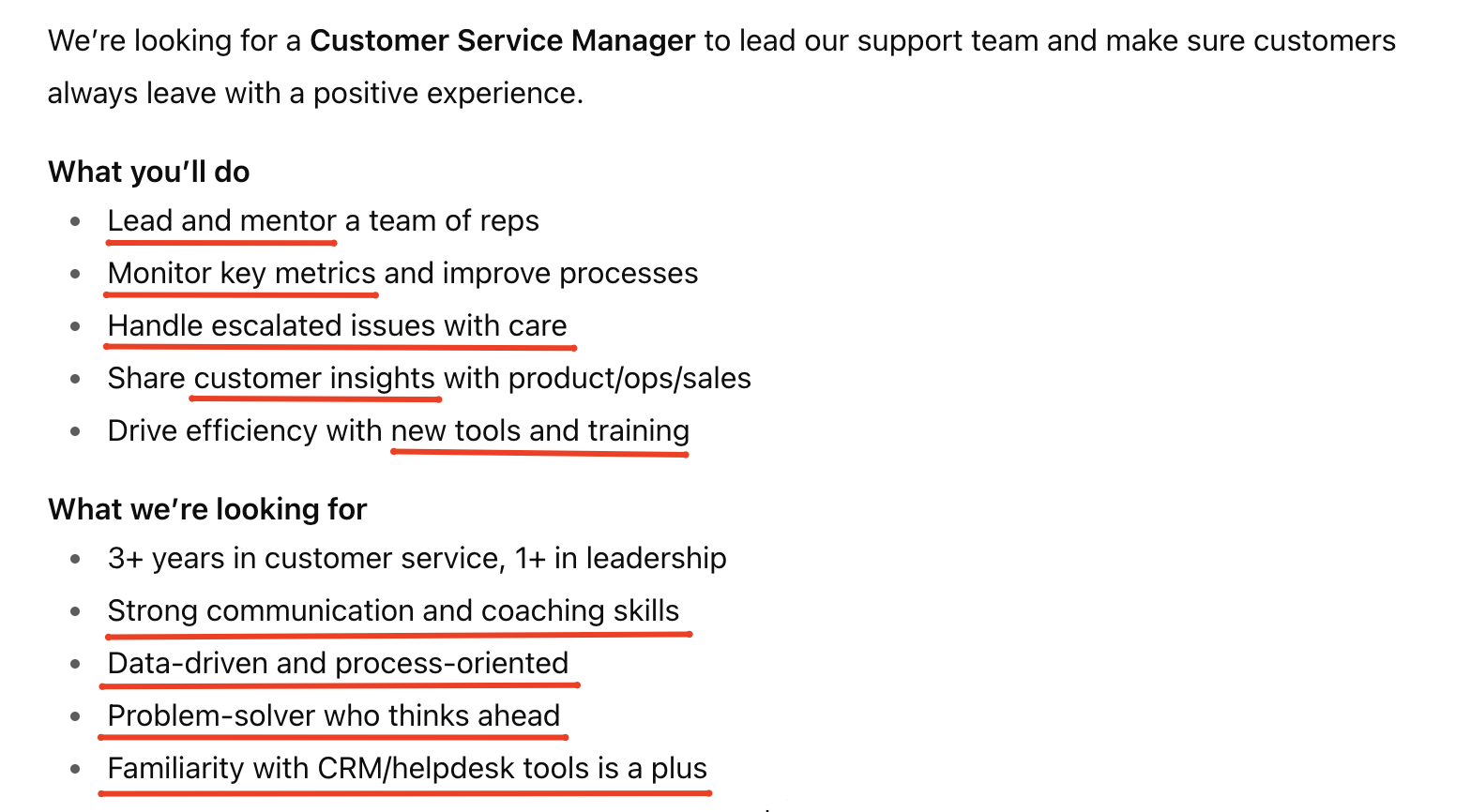
How to use the keywords
Once you know what matters most, weave those skills into your answers.
When applying for the role on the screenshot above, you’d know exactly what to focus on — not just the operational side of customer service, but the ability to lead others, build and improve processes, track results, and stay on top of CS technology. And if you had to tell a story about your communication skills, you could kill two birds with one stone and talk about how your skills helped solve a customer problem AND resolve a conflict within your team.
You’d know not to talk (only) about how many tickets you resolve per day or how many knowledge base articles you update.
Tools like PracticeAI can help you check whether you’re hitting the right notes. For example, I took an interview for the Customer Service Manager (see the job ad above). In it, I failed to demonstrate transferable skills that would make me a good fit for the CS Manager role. Here’s the feedback I got:
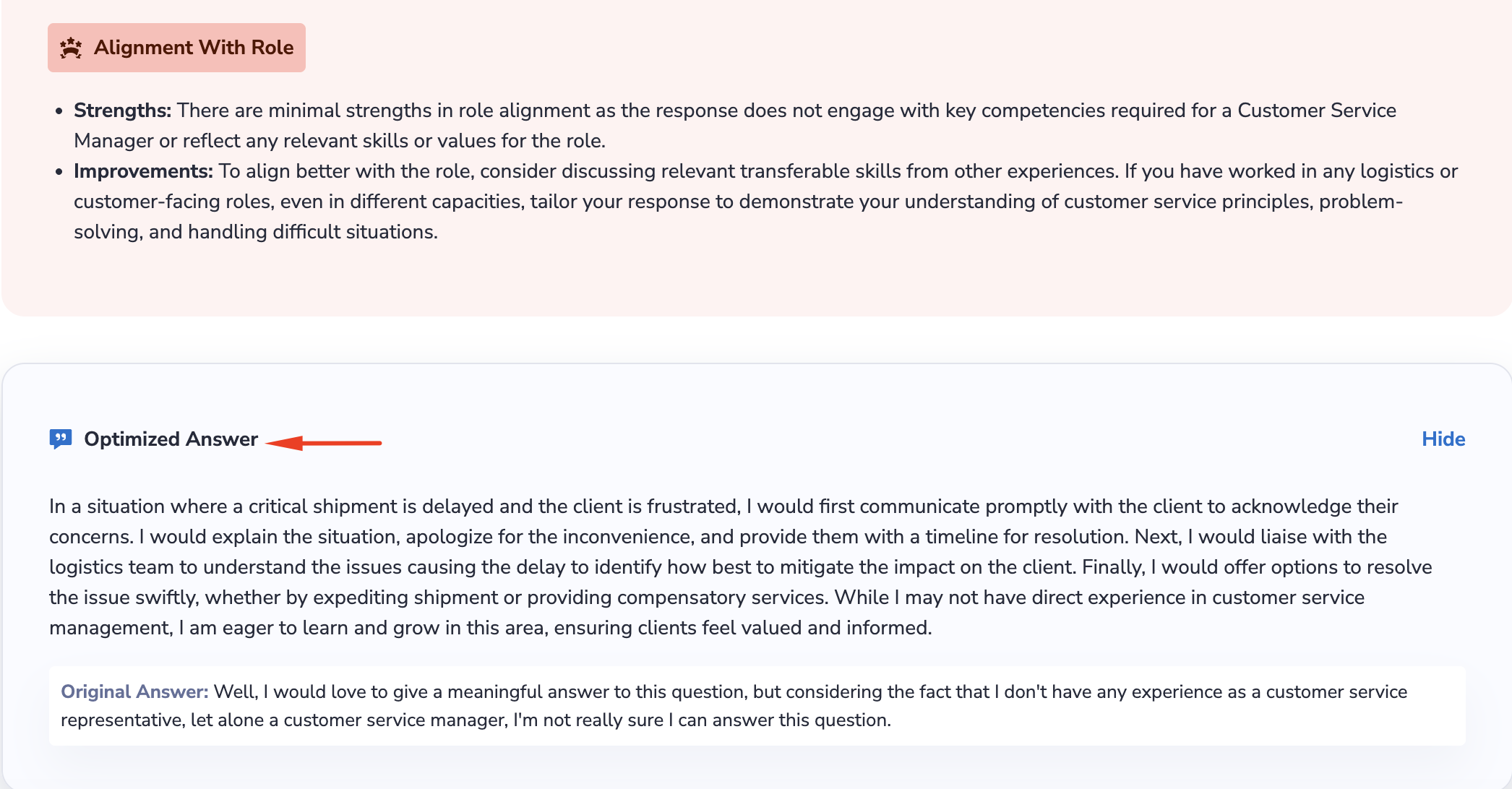
Now, I know exactly what to focus on and how to better demonstrate I’m a good fit next time.
Show confidence
Even if there’s no human interviewer on the other side, confidence still matters.
AI tools are designed to pick up on how professional and capable you sound — and a shaky, monotone, or rambling delivery can hurt your impression. The goal is to strike a balance: professional, but also warm and approachable.
That comes down to a few key signals:
- Steady pace
- Clear voice
- Minimal filler words
- Strong body language if it’s a video interview (eye contact with the camera, open posture, no slouching).
These details communicate confidence just as much as the content of your answers.
While there are no super-specific, quick tips to help you practice confidence (it often takes deep personal work), preparing stories in advance, practicing alignment with the role, and knowing what questions to expect in an interview can help you feel better prepared and therefore more confident.
💡Pro tip: Believe it or not, asking smart questions at the end of the interview can make you seem more engaged, confident, and serious about the role. This is what I did in my interview and got some bonus points for it:
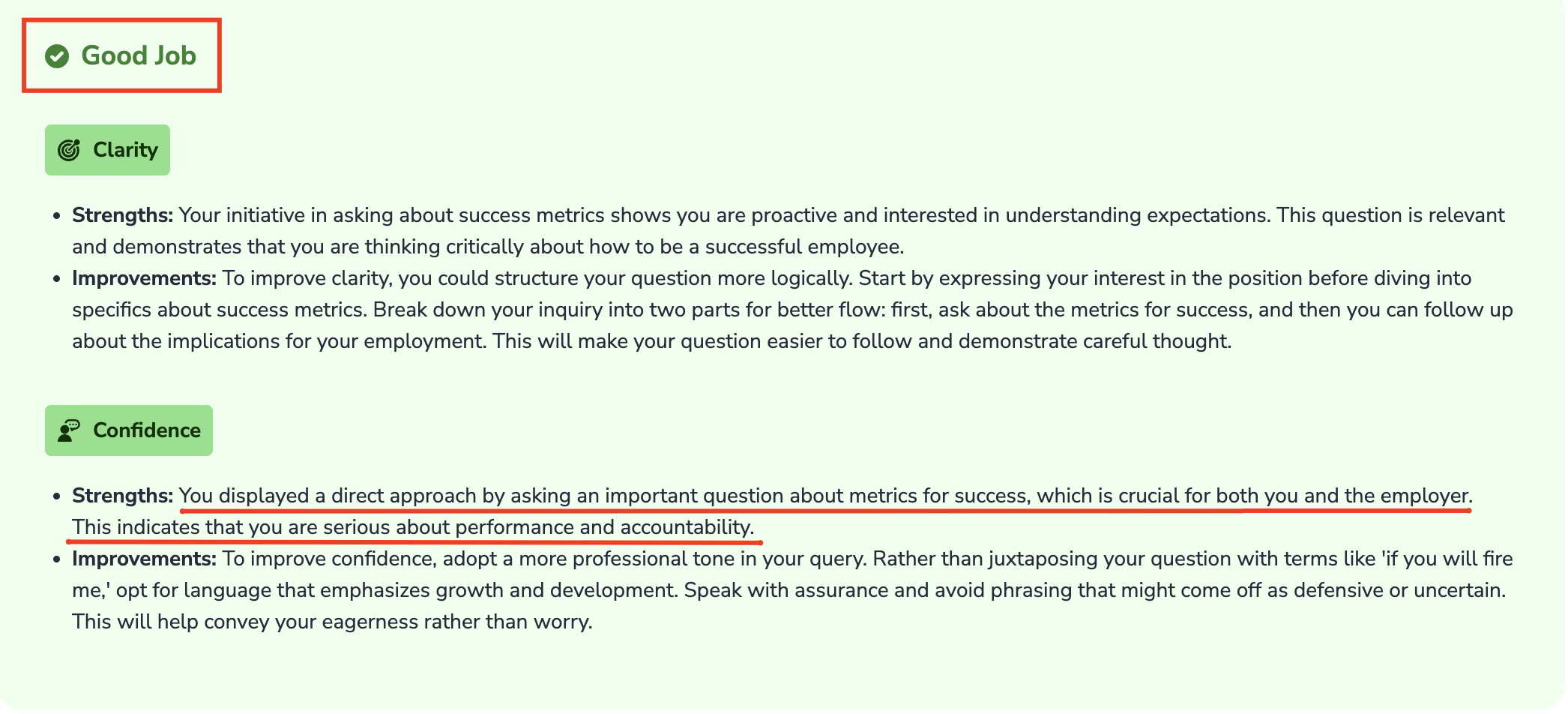
Even AI interviewers will ask you if you have any questions for them, and it’s your last chance to leave a good impression. If you need help coming up with good questions, check out our guide: 40+ Smart Questions to Ask at the End of Any Job Interview.
How to Shift Your Mindset and Turn AI into an Advantage
To sum things up, I know AI interviews feel strange at first, but resisting them only makes things harder.
The truth is, they’re here to stay, and, in some ways, they can work in your favor. Unlike a human recruiter who might get distracted or form a snap judgment, AI is consistent. It’s easier to impress if you give it the signals it’s programmed to recognize.
Flexibility is a big perk of AI interviews too — you can choose the time and place that works best for you, which takes away the stress of traffic, scheduling conflicts, or having to perform in a high-pressure office setting.
To finish things on a positive note, I’d like to share that there are studies that show that candidates who bring personality and soft skills into AI interviews perform better. One study even found that the candidates interviewed by AI were 12% more likely to get a job offer and more likely to still be employed a month later compared to those interviewed by humans.
You got this!
Summary of the Main Points
- AI interviews aren’t going anywhere. More companies use them as the first step of the hiring process, so skipping them means skipping the opportunity altogether.
- In some ways, it’s easier to impress an AI interviewer. AI likes structure, and if you know what it’s looking for, you will easily leave a good impression and land a next step in the process.
- The key is to have clear and confident answers and to demonstrate you’re a good fit for the role.
- To do this, practice answering common interview questions using the STAR and PAR frameworks, and extract keywords from the job description so you know what skills to focus on.
FAQ
How is an AI interview different from an interview with a human?
The biggest difference is that there’s no small talk or chance to build rapport. Instead, you’ll be talking to your laptop (or typing answers) while the AI evaluates your responses. It focuses on structure, clarity, and whether your answers align with the role, not your personality quirks or charm.
What kind of questions can I expect in an AI interview?
Pretty much the same ones a human would ask. Some AI interviews use pre-recorded, static questions, while others generate dynamic ones based on your resume and the job ad. Either way, expect classics like “Tell me about yourself,” behavioral questions, and role-specific questions. Advanced AI might ask questions about details from your resume, so be ready to elaborate.
What is it that AI looks for in job interviews?
AI is scanning for clear, structured answers that directly address the question. Think keywords from the job description, logical flow (like STAR or PAR), steady delivery, and results backed by examples. Nuance and “reading between the lines” don’t work here.
How can I prepare for an AI interview?
Practice structured answers to common questions, rehearse your key stories from different angles, and pay attention to your delivery — steady pace, confident tone, minimal filler words. Tools like PracticeAI can even generate tailored questions from your resume and give you feedback so you know exactly what to improve — and what questions to expect in the first place.
What are the key skills I should demonstrate in an AI interview?
It will depend on the role you’re applying for, so your best bet is to study the job description, extract key skills and duties, and see which ones you have and how to best display them. Generally, some skills that are valuable for almost any position in any industry are strong communication, problem-solving, adaptability, independence, and confidence. Even though AI is doing the evaluating, being warm, expressive, and human can actually boost your score.
How to use AI for a job interview?
There are AI tools, like PracticeAI, which you can use as your prep partner. These tools can help you anticipate questions you’ll likely get, practice answering them, check the clarity of your answers, and spot things you might miss on your own (confidence issues, pace of speech, verbal filler, alignment with the role…). If companies are using AI to screen candidates, it only makes sense to use AI yourself to prepare and level the playing field, so make use of these tools if you have the chance.
